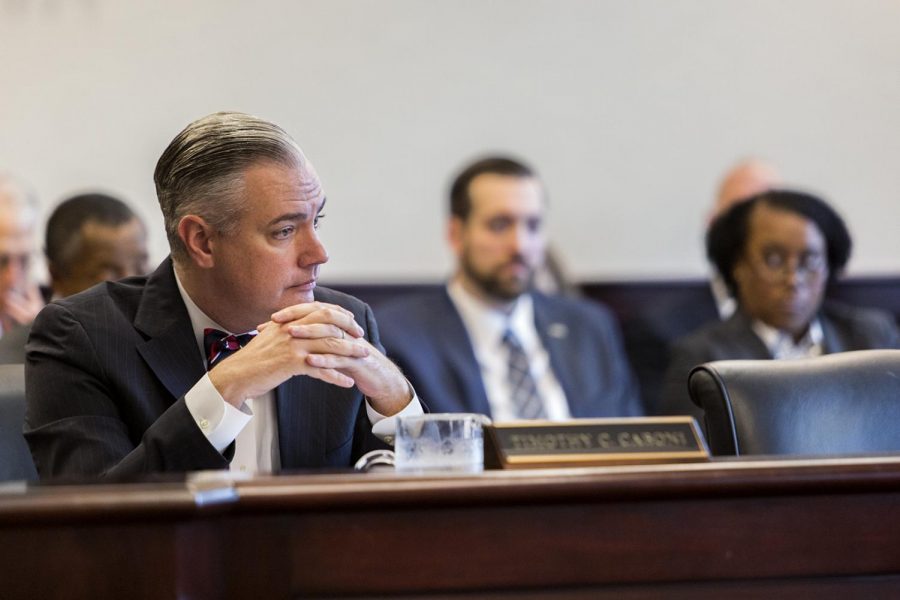Budget Council recommends closing University College, reducing workforce
February 27, 2018
To combat the current $15 million budget deficit, WKU’s Budget Council has recommended eliminating University College, reducing the university’s workforce and returning management of the three regional campuses to the Division of Extended Learning and Outreach.
The recommendations were announced at the quarterly meeting for the Board of Regents on Friday. Other recommendations include reducing the number of university vehicles and reorganizing or consolidating similar jobs and units.
“We are employing multiple strategies to put WKU on a more sound financial footing for the future, and these include our strategic planning efforts, our work with Huron Consulting to revamp our budget model and, of course, this effort to balance our budget,” President Timothy Caboni said during a press conference following the meeting.
A number of units will also see budget reductions. Academic Affairs’ budget see the largest reduction at 46 percent of the cuts or over $7 million. Athletics will also lose over $1 million which is an 8.4 percent of the total cuts . The reductions total just under $16 million.
Caboni tasked the budget council last fall with examining WKU’s budget model and addressing the current deficit as well as recommending new policies. The council includes one student, four faculty members and five staff members. The group produced 35 recommendations, a majority of which Caboni accepted.
WKU’s deficit stems from a decrease in enrollment and state funding in the past few years, Caboni said. The deficit is expected to continue to grow this year. Gov. Matt Bevin has proposed a 6.25 percent cut to state funding. If approved, WKU could lose $4.6 million.
Earlier this year, Caboni said WKU could have a budget deficit as large as $40 million. The $40 million comes from the current $15 million deficit, the anticipated $4.6 million cut, WKU’s nearly $9 million pension obligation and an anticipated $10 million deficit from enrollment changes and fixed costs. Additionally, WKU may also lose $750,000 if Bevin’s proposal to eliminate the Kentucky Mesonet, a statewide weather and climate monitoring system, is approved.
This is the first round of Budget Council recommendations. Caboni said more cuts can be expected after the legislature releases Kentucky’s final budget model in April.
University College
Following recommendations from the Budget Council, University College will be eliminated effective July 1.
Academic programs, which include African American Studies, Interdisciplinary Studies and Organizational Leadership, will be allocated to other colleges across WKU.
“We will consolidate the functions within University College that duplicate campus support systems and integrate others into Student Affairs or appropriate campus departments,” Caboni said in an email.
University College currently has the lowest enrollment compared to other colleges at WKU, according to the WKU Fact Book. In 2016, University College had a total enrollment of 1,370 students. The College of Education and Behavioral Sciences had the next lowest enrollment with 2,236 students.
Enrollment in University College has decreased by 30 percent from Fall 2012 to Fall 2016.
Provost David Lee said he planned to speak with people in University College to find a match for their academic programs over the next few weeks to work out the transition “in a pretty smooth and transparent way.”
“I’m not terribly concerned about finding suitable homes for those programs, and they’ll continue to function,” Lee said. “From a student perspective … you might go to different classrooms, but other than that, I don’t think you’ll notice much change in how those programs function.”
University College Dean Dennis George has been at WKU 26 years and said while he is still trying to absorb the shock of his college’s elimination, he still considers WKU his home.
He said he was unsure what it meant for his own future at WKU, but he is more focused on “getting through this painful process.”
“It’s certainly difficult to imagine being separated from people you’ve known and worked closely for years,” George said. “[Employees of University College] are the most wonderful people in the world and deserve good homes.”
George said he has had conversations both with Lee and Budget Council Chair Indudeep Chhachhi. He met with Chhachhi before winter break to discuss the future of University College.
“I know recommendations were made thoughtfully,” George said.
Lee said he has no plans to eliminate any academic programs from University College “at this point in the process,” but he said a thorough review of all of WKU’s academic programs will begin next year.
“This is not a quick fix,” Caboni said. “It’s really thinking about what students who come to WKU want to study, and if we have those programs.”
Workforce Reductions
Caboni also accepted the Budget Council’s recommendation to eliminate 40 currently vacant positions and to terminate 90 to 100 already filled positions.
Caboni said employees will be informed if they will lose their jobs by mid-March, and the losses will occur across the entire university.
“This is painful; this is painful for our entire campus,” Caboni said. “I ask you to respect the fact that these decisions affect real people’s lives.”
The Budget Council did not recommend which specific positions should be terminated. Caboni said the decision will fall on the vice presidents and deans. WKU will pay terminated employees through June 30. All eliminations will begin July 1.
“This has nothing to do with talent,” Caboni said during the press conference. “It has everything to do with resources.”
Caboni said WKU will continue to provide support to those individuals who will lose their jobs. He said human resources is ready to “wrap its arms around folks and support them” through the technical aspects of finding a new job. He said there are 1,200 vacant positions in Warren County that require a four-year degree.
“We’re going to do everything in our power to create a pipeline with the folks whose positions have been downsized to have access to those open positions,” Caboni said.
Ann Mead, vice president of finance and administration, said human resources will partner with the career center to reach out to people on a one-on-one basis to help with finding a job or choosing another career.
WKU had already altered its hiring process to account for the deficit. A Personnel Actions Approval Committee lead by Mead was formed last fall to review all requests to fill positions and determine whether they were critical to the university. Only positions deemed critical to WKU’s operation were filled.
The personnel reductions total just under $10 million and make up two-thirds of the $15 million reduction.
“This is the worst decision anyone in this position ever has to make, and we’ve done it with the most amount of care that we possibly can,” Caboni said.
Claus Ernst, the faculty regent, said the faculty has expressed concerns about the workforce reductions. He said he has known layoffs were likely since last fall, but he didn’t know how many layoffs would happen.
Ernst said he expects more layoffs after the General Assembly releases the budget plan in April. He said the current budget reductions proposed by the Budget Council pertain to the $15 million deficit and not the cuts that are expected to come from the state in April.
“I do not know how to do this without affecting personnel,” Ernst said of the cuts.
The Budget Council also recommended a 4 percent campus-wide salary increase pool. The pool would start on Jan. 1, 2019.
“This is something we must do for our faculty and staff,” Caboni said.
Regional Campuses
Under the Budget Council’s recommendations and with Caboni’s approval, WKU is returning its three regional campuses, Glasgow, Owensboro and Elizabethtown-Fort Knox, to the management of theDivision of Extended Learning and Outreach (DELO).
DELO was officially formed in 2003 with the approval of the Board of Regents. Housed under DELO are numerous academic outreach units such as the Distance Learning Testing Centers, Study Away, WKU On Demand, winter term courses and summer course sessions and WKU Dual Credit.
At a press conference following the regents meeting, Caboni, when asked if the regional campus buildings would be eliminated and everything would go online, said there’s not any intentions to move away from in-person classes on the regional classes.
However, he said there is an intention to offer courses in a way that is directly connected to the local economies of the regional campuses and focuses on what the people in those communities desperately need.
“I’ve used this example a couple of occasions,” Caboni said. “As much as I think it’s interesting to offer a history degree on our Glasgow campus, I’m not sure that best meets the needs of the local economy.”
The Herald reached out to Bob Skipper, director of media relations and asked if there are any plans to eliminate in-person courses at the regional campuses or if they would be moved completely online. Skipper did not respond before publication. The Herald also reached out to Beth Laves, associate vice president of DELO. She did not respond before publication. This story will be updated with the comments when they are available.
Evelyn Ellis, regional chancellor of the Elizabethtown-Ft. Knox campus, said she was excited to hear about the changes and hopes to do more to align her campus with employers in the area.
“I think it’s a breath of fresh air,” she said.
Ellis said the Elizabethtown-Ft. Knox campus receives many non-traditional students, such as veteran students and students who are already in the workforce but are in search of additional education to help them move up in their jobs.
Ellis said whereas the Bowling Green campus is viewed as a more traditional experience, the Elizabethtown-Ft. Knox campus works more to help people already in the workforce.
“I see the regional campuses as motorboats and Bowling Green as the cruise ship,” Ellis said.
She also said the Elizabethtown-Ft. Knox campus is important because it helps deter people from going to the University of Louisville. She said she often hears from people how UofL is closer, and WKU is farther away, but the regional campus is helpful because they can work with students closer to that side of the state.
“We’re fattening frogs for snakes,” Ellis said.
Sally Ray, regional chancellor of the Glasgow campus, said she was surprised to hear about the changes, and last Friday’s Board of Regents’ meeting was the first she heard about the return to DELO.
She said she believes Caboni has a good understanding of the areas the regional campuses serve and is supportive of the institutions that serve those constituents. She said, however, there have been challenges in the past with getting the right programs to the campuses for those local constituents. She said DELO’s flexibility would hopefully help with that.
“The intent is, by moving the regional to DELO, is it would allow the regional campuses to be better equipped to deliver programs that are aligned with workforce needs in the region,” she said.
She said for Glasgow, the areas that would best align with the occupational growth in the region are in healthcare, business and education.
Former provost and faculty regent, Barbara Burch, was instrumental in the formation of the division, according to DELO’s website. Burch said she took Caboni’s decision to move the regional campuses back to DELO management as a commitment to strengthening the regional campuses.
“University College has been a fine home for them … but part of DELO’s mission is outreach,” she said.
Burch said prior to the creation of DELO, there was no extended-outreach education division at WKU, and there wasn’t a mechanism inside the university for dealing with online learning. She said DELO was built as a way to provide incentive for online programs.
According to the impact report, in 2016, over 2,400 students took solely online courses through DELO, and 4,800 students took courses in a mix of delivery methods, such as a blend of online and face-to-face.
Online classes also make up 51 percent of course enrollments across the regional campuses, according to the Fall 2017 Regional Campus Enrollment Report.
“With the tightness of our fiscal situation, hopefully DELO can still be positioned to do good things for our university,” Burch said.
Caboni also said there would be reductions in staff at the regional campuses in an attempt to centralize services that are offered across all the campuses.
When asked during the press conference if some of the 90 to 100 currently filled positions that will be terminated would come from the regional campuses, Caboni didn’t specify and said the cuts would be across the entire university.















